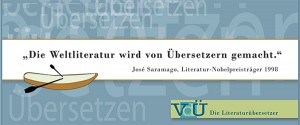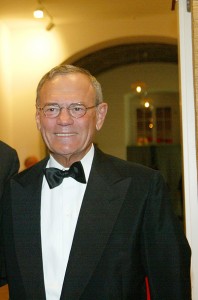On Behind-the-scenes Labor in the Cultural Economy

“Translators create universal literature.” José Saramago, Nobel Prize Winner for Literature 1998
© VdÜ (Germany’s Union of Literary Translators), design: Christian Hoffmann
Today is Giornata mondiale della traduzione, Międzynarodowy Dzień Tłumacza, Journée mondiale de la traduction, Uluslararası Çeviri Günü or Día Internacional de la Traducción—which is to say, International Translation Day, an occasion established in 1991 by the Fédération Internationale des Traducteurs (FIT: International Federation of Translators) in order to raise public awareness of the cultural impact of the wordsmith’s trade. 30 September is the anniversary of the death in 420 CE of Hieronymus, who translated the Hebrew Bible into Latin. Since ancient times translation has influenced the target language in question, and in the globally networked world of today it is our constant companion. Germany’s Union of Literary Translators (VdÜ) puts it in a nutshell: “Wherever words have been spoken, written, read, or even sung, translators have had a finger in the pie, and indeed they still do; and it is thanks to them that the whole world is at home in its own language.” → continue reading
During the week of 21 to 27 October 2013, the Academy of the Jewish Museum Berlin, in cooperation with Kulturkind e.V., will host readings, workshops, and an open day for the public with the theme “Multifaceted: a book week on diversity in children’s and young adult literature.” Employees of various departments have been vigorously reading, discussing, and preparing a selection of books for the occasion. Some of these books have already been introduced here over the course of the last weeks.
 When my little 6-year-old daughter said to me, “you know, Mama, being gay seems strange to me,” I didn’t discuss it with her for too long. Instead I headed out and bought a copy of Alles Familie! Vom Kind der neuen Freundin vom Bruder von Papas früherer Frau und anderen Verwandten (All in the Family! About Daddy’s ex-wife’s brother’s new girlfriend’s kid and other relatives) since nothing is strange in this book. Every form of cohabitation that people engage in is introduced completely impartially: → continue reading
When my little 6-year-old daughter said to me, “you know, Mama, being gay seems strange to me,” I didn’t discuss it with her for too long. Instead I headed out and bought a copy of Alles Familie! Vom Kind der neuen Freundin vom Bruder von Papas früherer Frau und anderen Verwandten (All in the Family! About Daddy’s ex-wife’s brother’s new girlfriend’s kid and other relatives) since nothing is strange in this book. Every form of cohabitation that people engage in is introduced completely impartially: → continue reading

Rafael Roth, 2003 © Jewish Museum Berlin, photograph: Bildschön
In late 1998, long before the Jewish Museum Berlin opened its doors, the Berlin entrepreneur Rafael Roth offered to support the museum financially. He was committed to W. Michael Blumenthal’s vision of a center dedicated to research on and education in the history of Jewish life in Germany.
Roth was enthusiastic about the idea of a modern media center that would enable visitors to explore Jewish history in an interactive format. His generous donation funded the architecture, the concept and the technical development of this center, located on the subterranean level of the Daniel Libeskind building. When the “Rafael Roth Learning Center“ was inaugurated together with the permanent exhibition on 9 September 2001, it fulfilled its initial purpose, namely to be “the most up-to-date, most impressive and most important center of its kind.” Twelve years later, the media-lounge and study rooms still attract a great number of museum visitors.
Rafael Roth died on 21 September. The Jewish Museum Berlin is highly indebted to him and remembers him in great fondness.
Mirjam Wenzel and Henriette Kolb, Media


